The conflict throughout Ali's reign between himself and Muawiya was supposedly due to his reluctance and decision not to find and punish Uthman's killers, and hence regarded as an indirect accomplice in the murder. This seemed to be sufficient reason for Muawiya not to pay allegiance to him, as it was his duty as an Arab chieftain to avenge Uthman's death . However, historians such as Kennedy, tend to agree with the Shia view, "treating this claim as a feeble pretext for his actions." The Shia especially tends to disgrace and humiliate Muawiya, vilifying him for his opposition to Ali out of sheer lust for power and status . However Shia and Sunni historians tend to be biased on their views of Muawiya, thus diminishes their reliability and proper judgement on his character and rule. Sources and historical knowledge on his life and career are very scarce and of his inner motives and purposes we know even less.
General consensus among historians, although a simplistic one, states that the main reason behind Muawiya's rebellion against Ali was vengeance for Uthman. While it may be perceived as just that, only a few have managed to delve deeper into the underlying reasons behind Muawiya's actions. Some traditionists such as al-Jurjani, Baladhuri and Awana have a totally different outlook, eliminating Muawiya and holding that Amr b. al-As was the one who initiated and organized the agitation and combats against Ali in Syria. Amr was a cunning political genius, who was also behind the arbitration that deposed Ali, and thus possible that he was the brains behind Muawiya. Other views re-examine the revolt against Uthman. Several reports accused Muawiya of sensing the imminent catastrophe and exploiting it for his own selfish ends and "began scheming and desired Uthman's killing so as to succeed him as caliph" while others showed him in a favourable light - claiming he came to Uthman's appeals as soon as he realised how serious the situation was but was just too late. According to Madelung, "Uthman had meant little to him; he had done nothing to aid him and felt no personal obligation to seek revenge." From this evidence and Muawiya's deliberate delay for Uthman's appeals for help, it is thus conflicting with his reason for opposing Ali - blood vengeance; this was in fact a great 'political utility' for his own secular ambitions and just a way to satisfy his Umayyad kinsmen who look to him for leadership and to avoid alienation.
This claim is further supported since his launch for vengeance in Syria was only after the battle of the Camel, six months or more after Uthman's murder. Coincidentally after the first civil war, which further stained Ali's image as caliph, Muawiya demanded that a Shura be set up for the purpose of nominating an untarnished caliph. If he was so keen to seek revenge, why did he wait that long? Instead, the difficult position he was in had spurred him into action. Ali had dismissed most of the provincial governors appointed by his predecessor to reward his supporters for their services however, Muawiya on the other hand had built a strong local power base in Syria and refused "to be dismissed with ease or to stand by and see Uthman's work undone." Now Ali's presence in Iraq and Qays b. Sads precarious control of Egypt exposed him and Syria to potential attack from two fronts. Even if Muawiya had accepted the oath of allegiance to Ali, Ali would have certainly used his authority to remove him from his position as governor of Syria; so might as well not give his allegiance and use the demand for blood vengeance as a tool to raise rebellion against Ali and secure his hold on Syria. Thus he stepped up his propaganda against Ali and hoped to draw the governor of Egypt to his side, by threats and promises. His determination to remain in power rather then genuinely seeking revenge for Uthman reflects his selfish character and his unlawful tactics against Ali affirm his position as one of personal gain.
Keeping to that point, "It has been suggested that the contest between Ali and Muawiya entailed some degree of territorial competition between Iraq and Syria." This suggestion was supported by Hitti, stating "The issue however, was more than a personal one; it transcended individual and even family affairs. The real question was whether Kufa or Damascus, Iraq or Syria, should be supreme in Islamic affairs." A victory for Muawiya's army would mean Syrian domination over the rest of the empire, supporting his claim for caliphate and again another example of his lust for power. Some historians state the real aim of Muawiyah was to create difficulties in the way of Ali in order to pave the way for the transfer of power to the Umayyads. The conflict between Ali and Muawiyah was really the recurrence of the old rivalry between the Hashimites and the Umayyads, who "believed that the caliphate had through Uthman become 'their property'." However this aim was unlikely the main reason of conflict but rather served as an incentive for the members of each clan to fight. Again power always seems to be the motive; the new Arab civilization the Prophet had strived for is gradually reverting back to their old Bedouin ways.
Another reason for Muawiya's opposition against Ali was the effects it would have if he had paid allegiance. As stated by Humphreys: "the acknowledgment that Ali had come to power in a rightful manner, that there were no other legitimate claimants for the office of caliphâ¦" Muawiya could not afford for these effects to take place, as he will practically lose all his power and status. In fact, Ali's appointment to caliph lacked legitimacy. Although his close kinship with the Prophet and merits for Islam seemed enough for his claim, "He was not chosen by a Shura, which Umar had stipulated as a condition for valid succession." Moreover doubts surround whether his attitude towards Uthman's murder permit him to fill the caliphate. Despite that, throughout the Battle of the Camel and the Battle of Siffin, Muawiya had "made no claims of his own" until later on, concentrating foremost on his position as governor of Syria and waiting until Ali compromised himself by his conduct before intervening in the course of events . Muawiya had no claim or the support needed to aspire for the caliphate and his status as a late and 'convenient' convert without early merit in Islam did not help him. The disintegration of Ali's caliphate was then ascribed to "Kharijite opposition rather to his activities, which was religiously unlawful" although he was the one who started the chain reaction which led to these events. His vengeance for Uthman and determination to keep his governorship led to the Battle of Siffin, which led to the arbitration, which weakened Ali's position and then Muawiya "openly asserted his claims to the caliphate." All the right pieces had suitably fell into place to strengthen his claim to the caliphate and kudos has to be given to him for his political shrewdness, moderation and self-control.
There is little historical evidence to associate Muawiya with the deaths of Hassan and Husayn. Although Muawiya had made a financial agreement with Hassan not to claim his caliphate, people today, mainly Shia, still implicate him with his death, claiming that he was "possibly poisoned because of some harem intrigue." Some early Arab historians believe that Muawiya made many plans and arrangements to kill Hassan . It was said that he secretly contacted Hassan's wife Ja'da bint al-Ash'arh ibn Qays and instigated her to poison her husband, promising gold and marriage to Yazid in return . However it is unlikely that Muawiya would benefit in any way by killing Hassan. Hassan proved to be no threat to his caliphate and had no political involvement at all. Because of the lack of substantial evidence, it is safe to conclude that Hassan's death was not connected to Muawiya's personal motives against Ali. The same could be said for Husayn's death; Muawiya had already passed away and the focus has shifted to his son, Yazid I. Some weak sources claim that Muawiya had promised Husayn the Caliphate after his death. Here, it can only be assumed that he wanted to keep the power in his family and the Umayyads, and it's possible that there might still be some personal vendetta against Ali, thus he went back on his word and arranged the accession of his son, Yazid I and indirectly played a part in Husayn's death.
Muawiya's nomination of Yazid caused a stir in the Muslim community, those opposing the plan, quickly "accused Muawiya of attempting to set up a hereditary monarchy." It also brought about speculation of Muawiya's Islamic practice and its ideals. However, he probably realised the flaws of a democratic caliphate and sensed that a monarchy would be the best way forward for the Muslims, considering the fact that the Arabs supported the notion during the issue of succession of the Prophet in the case of Ali. Armstrong though states that he "depart from Arab traditions in order to secure the succession." Weiss and Green rebuke this statement, believing that "even in this matter Muawiya showed deference to Arab sensitivities. Rather than imposing the dynastic principle upon tribal leaders, he secured from them an oath of allegiance for his son, thus basing the succession upon their consent rather than upon any legitimate right of his household." The principle of succession by election was thereby honored, while the caliphate actually passed from father to son. Muawiya had found a loophole though this system and consequently created a precedent for a de facto dynasty. But considering Yazid's character, "an absolute playboy" , the religious quality of the caliph has taken a back seat to the politics, therefore also reflecting Muawiya's religious grounding and proves that his intentions were to keep the Umayyads in power.
Muawiya's actions throughout his career demonstrate that "his virtues were those of the successful politician, not of the brilliant general or the religious leader." Most historians, such as Kennedy, Armstrong, and Peterson etc. agree that Muawiya was problematic in religious context, stating that he is far from ideal and "religiously unworthy" . According to Humphreys, "In formal piety and personal conduct, he was acceptable enough (at least he provoked no public scandal) but he was never regarded as religiously learned or even thoughtful and engaged, beyond a superficial level. He believed in God and was publicly correct in his observances but no more." His lack of Islamic practice could be confirmed in his actions and decisions. Religiously unlawful activities and backhanded methods of gaining power and status against Ali establish his disregard and failure to adhere to simple Islamic principles, ideals, the Quran and Hadith.
In conclusion, although Muawiya was a symbol of the conflicts and anxieties that afflicted the Ummah, he is decisive political figure in the history of Islam. Muawiya was "literally the only man with political and military resources available to restore unity" , despite lacking a religious moral ground. Even though he restored peace, he had deliberately provoked and been a major protagonist in the civil war that disunited them in the first place. Whilst historical evidence on his personal thoughts and intentions are not solid, it is evident though that his ascension to caliph and power was ultimately partly due to his own machinations.
Bibliography:1.Armstrong, Karen, Islam: A Short History, Phoenix Press, London, 20022.Hawting, G. R., The History of al-Tabari Volume XVII The First Civil War, New York Press, USA, 19963.Hitti, Phillip K., History of the Arabs, Macmillan, New York, 20024.Humphreys, Stephen R., Muawiya ibn Abi Sufyan - From Arabia to Empire, Oneworld Pubns Ltd, 20065.Kennedy, Hugh, The Prophet and the Age of the Caliphates, Pearson Education Limited, Great Britain, 20046.Madelung, Wilferd, The Succession to Muhammad - A Study of Early Caliphate7.Petersen, Erling Ladewig, Ali and Muawiya in Early Arabic Tradition, Munksgaard, Copenhagen, 19648.Weiss, Bernard G. and Green, Arnold H., A Survey of Arab history, Cairo, Cairo Press, Amer. Univ., 1990
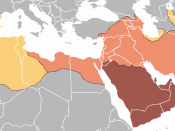
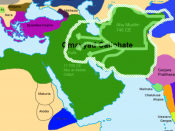



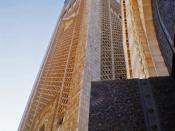
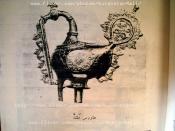

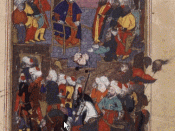
Very good essay in general
i must say, this essay is very good overall. Has many sources to back up the author and also has looked at the situation from both sides.
1 out of 1 people found this comment useful.